ISO Consultation Certification Services

Our Clint Rating: 4.8 Start Based on 16 users
ISO 14001:2015-Environmental Management System
ISO 14001 is the worlds most popular standard for environmental management is revised on 15 September 2015, with key improvement that make it fit for the future.With the alarm of global warming and its consequence the human society has become serious about the ecology and its preservation. ISO 14001 EMS helps to maintain the Environment around us, by following certain management standards. Environmental regulations are getting stricter, and so is the law enforcement. Customers and shareholders increasingly demand to diminish the environmental impact from their business, demonstrate what they do, and how they improve.An Environmental Management System helps your organization to be in control of and successfully manage the most significant environmental aspects, e.g. emissions, waste handling, utilize natural resources, and energy-efficiency.
The ISO 14001 – Environment Management System standard will benefit every organizations to:
- Classify, cope and control the environmental impacts related within the organizations activities, products and services;
- The results on a thorough implementation will lead to the continual improvement benefits within the organizations environmental impacts and performance. This can also being achieved through the goal-setting of attainable/ quantifiable environmental objectives and targets.
- Compliance and conformities on all the environmental legislation/ regulation/authorities.
- The Environment Management System provides an outline for every organizations to execute/implement policies, plans, procedures etc. aligned within the organizations objectives and policies.
Other key improvements in the new version include:
- A greater commitment from leadership
- Increased alignment with strategic direction
- Greater protection for the environment, with a focus on proactive initiatives
- More effective communication, driven through a communications strategy
- Life-cycle thinking, considering each stage of a product or service, from development to end-of-life
An ISO 14001 implementation and certification proves that you’re Environmental Management System has been measured against the best practice standard and compliant.
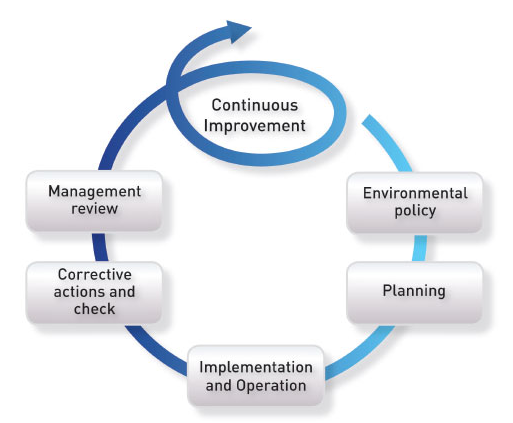
Adapted from the ISO standard: ISO 14001:2004
Phase I - Establishing the environmental goals (policy). The organizations Environmental Policy must be well-defined by the Top Management and shall be ensured that it is fully aligned within the scope of its Environmental Management System. This shall be well-documented, fully implemented on all levels and shall be properly maintained throughout the organization.
Phase II – Planning the elements of the EMS in relation to the Environmental aspects shall be formed, executed and sustained. This phase will identify the organizations environmental aspects on the independent activities, products and services. Every organizations must ensure that all the significant environmental aspects shall be considered in forming, executing and sustaining the management system.
Phase III – Implementing the EMS within the organizations shall involve all the Top Management and shall appoint the designated management representatives to ensure that the EMS is being fully implemented across the organization at all levels.
Phase IV – Checking for any problems and correcting them. Corrective Actions and Checking shall be maintained to ensure that the organizations policy is being complied while the EMS remains appropriate/applicable.
Phase V - Management Review shall include the scope and elements of the EMS that requires to be reviewed, and the review process may take place over a period of time depends within the requirements to be met by every organizations. This phase will conclude the effectiveness of the EMS and how to continuously improve it and launching into a new cycle of improvement.
One an organization have an Environmental Management System in place, the certification body will perform and external audit, after the successive audit – the certificate of registration will be issued for ISO 14001.
-

Implementing an Environmental Management System is a systematic way to discover and control the effects your company has on the environment
-

The company which is an ISO 14001:2004 certified can generate further business through tenders with larger companies which requires contractors to be an ISO 14001:2004 certified.
-

Implementing an Environmental Management System is a systematic way to discover and control the effects your company has on the environment.
-

The standard is mainly focused on reducing environmental incidents which results to avoid the damages of the company’s reputation, and reduced the liability etc.
-

Improving cost control through materials and energy, cost savings in waste, recycling and consumption that can be used in other beneficial technology/activity.
-

Compliance to Environmental Legislations and management of with Environmental Risks with compliance to the environmental regulations.
-

Boosts the company/organizations reputation, impression and engagement with the client and the respective authorities.
-

The above standard can continuously promote and improve employee ethics that could also create a positive awareness within the organization and society.
-

To increase every employee’s engagement in the knowledge that they are working in an environmentally friendly organization.
-

The focus of the standard is to demonstrate and validate the organization’s concerns and commitment for improving the environment.
The Nbiz GO-AIM-HIGH methodology was developed to provide the continuous success for every clientle’s project. It represents the Nbiz Team Consultants activities during the involvement from the initial phase until the last phase to conclude the project successfully.
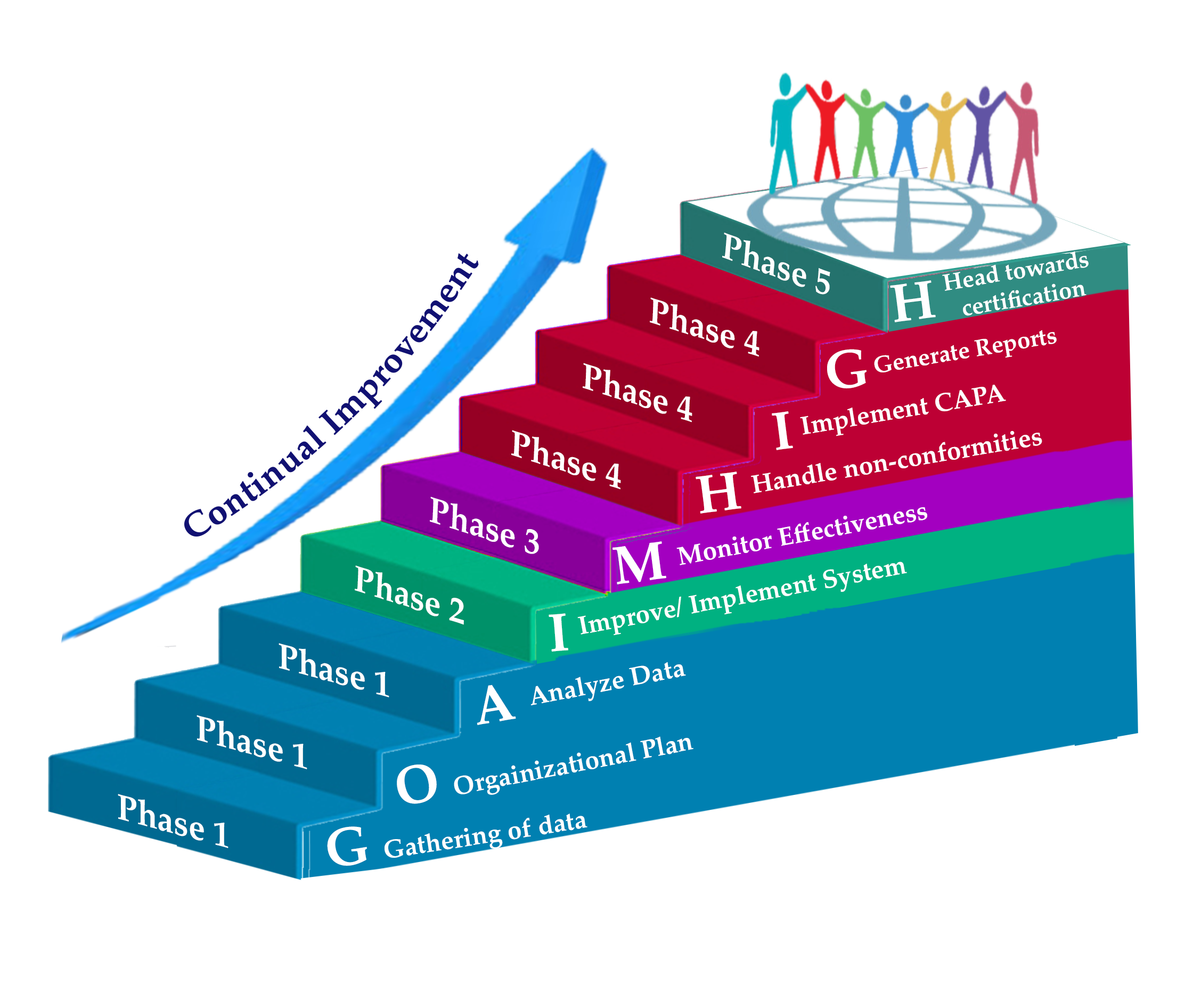
The acronyms on the GO-AIM-HIGH methodology are already tested, applied and proven methods by the Nbiz Team Consultants during the implementation of the project. These are the activities performed which represents the corresponding phases during the project implementation.
We are delighted to provide you the detailed explaination of our GO-AIM-HIGH Methodology on the below illustration.
G – Gathering of Data
The first step in the IMS Consultancy is gathering of data. In this, our consultants will be gathering all different types of relevant and existing records that are already with the client.
O – Organizational strength and weakness identification
The second step is aiming to identify the organizational strength and weaknessess.
A - Analyze and review documents, current processes and procedures
The third step in the IMS Consultancy is to conduct Gap Analysis of the current structure of the company which includes review of documents, processes and procedures in order to determine compliance to the required Management System standard. It is through this step that consultants and the company's key personnel can collaboratively formulate appropriate plan and activities to respond to gaps identified against the standard.
I-Improve, create and implement processes and procedures
The fourth step of the IMS consultancy is based on the gaps identified during step 1
Improvements and/or creation of documents meeting the requirements of the standard shall be initiated by the consultant in close coordination with the company’s key personnel. Documents shall include policies, manuals, procedures, forms/templates, instructions, etc. The documents created/improved shall be meeting the standard requirements and shall be suitable to the business activities and culture of the company. The company’s authorized representative shall review the documents and must be approved by the Top Management before issue. Additionally, Nbiz Infosol consultants shall guide companies to implement the set procedures and processes in order to comply with standard requirements. Appropriate trainings shall be provided to key personnel in order to provide or develop competence in the implementation of the system.
M-Monitor, check
Once standard is established, Nbiz Infosol consultants shall guide companies to monitor performance as per the required standard through performance measurement, check compliance and conformances through audits and inspections. Nonconformance shall be identified, reported and recorded accordingly.
H-Handle non-conformities
As part of the monitoring and checking, Nbiz Consultants shall assist companies in reviewing and re-assing their environmental aspects/impacts and occupational hazards and risks. The review and re-assessment shall be done on a regular basis or as per requirement of the ISO 14001:2004 and OHSAS 18001:2007 standards.
I-Implement corrective actions and recommendations
Once the nonconformities are identified, Nbiz Infosol consultants shall assist companies to identify root causes, implement corrections, corrective actions and preventive actions for nonconformance. Recommendations shall also be considered for continual improvement.
G-Generate reports
Reports shall be generated in all phases of the consultancy. Nbiz Infosol recognized that reports and records are essential to prove evidences of performed activities. Reports shall be properly channeled and submitted in correct and appropriate formats.
H-Head towards certification
Once, documents, procedures and processes are already established and implementation is considered adequate, Nbiz Infosol shall facilitate for the certification process of the companies. Nbiz Infosol consultants shall render support during all phases of the certification audits starting from planning with external auditors, during the actual audits, closing of the nonconformance and follow-up audits.
- Scoping on the required scope of certification. The general information required for the application and scoping are as follows:
- Initial System Study on the relevant field of certification applied and interested for, involved activities of the organization, no. of employees and the details on the available technical resources, any related subsidiary/entities.
- Any related information within the organization that will effect on the requirements to fulfill the conformity related processes, consultations on the management system, and requirements on seeking the certifications.
- Submission of the required and improved documents to obtain approval and certification from the authorized certification body.
- Coordinating Audit Plan – Our consultants will closely facilitate on the schedule communicated by the client. The audit plan will be prepared by the certification body and communicated to the client.
- Submission of the required and improved documents to obtain approval and certification from the authorized certification body.
- Facilitate to close NC’s – Our consultants will be assisting on developing and enhancing the identified non-conformances by the Auditor of the certification body.
- Facilitate in submitting non-conformities to certification body – Upon the identification of non-conformities, the consultants will be facilitating on clearing and completing all the identified non-conformities of the client to be submitted to the certification body.
- Co-ordination for approval of non-conformities and releasing of certificates from the certification body and providing the certificate the client.
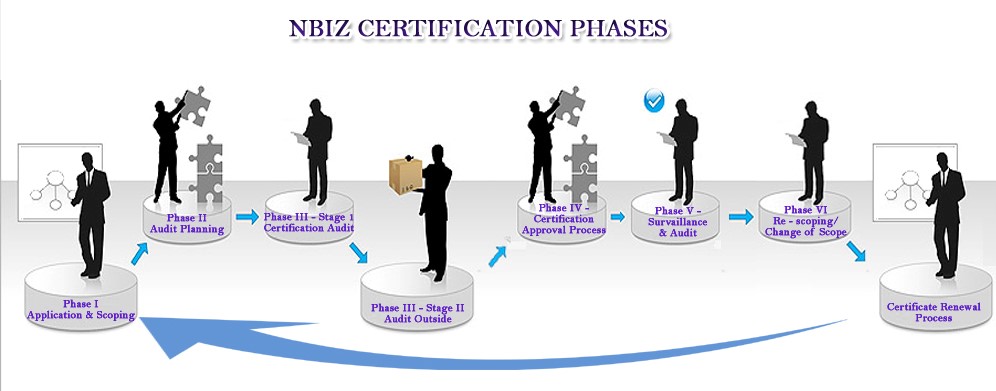
Nbiz Infosol Certification is in co-ordination with many leading certification body which are internationally recognized to help our client on achieving any relevant ISO Standards.
The phases on the above diagram explains only the commonly used processes/activities in order to provide a clear summary explanation/objective during the certification process.
Nbiz Consultants Team will facilitate mostly on gathering the requirements, coordinating on the schedule, as well as submitting the requirements to the certification body.
Nbiz Infosol will not have any control/influence on the schedule/decision by any Certification Body.
Kindly note that there are extra phases involved on each relevant standards that the Certification Body Representative may add and apply whenever necessary.
1. Phase I - Application and Scoping on the required certification.
The general information required by the Certification Body Representative for the application and scoping are as follows:
- Initial System Study on the relevant field of certification applied and interested for, involved activities of the organization, no. of employees and the details on the available technical resources, any related subsidiary/entities.
- Any related information within the organization that will effect on the requirements to fulfill the conformity related processes, consultations on the management system, and requirements on seeking the certifications.
2. Phase II - Audit Planning
- Identification of Audit Criteria, scope and objectives.
- Audit Schedule preparation
- Co-ordination with clients regarding audit details and logistics.
- Preparation of checklists, audit formats, etc.
3. Phase III – Stage 1 - Certification Audit
The Certification Body Auditors will perform the following:
- Certification Body Representative will gather detail for the company’s background/information and reviewing the existing documents to understand and evaluate the company’s set objectives, policies and procedures.
- Assessing the processes in place and comparing on the set objectives is being facilitated by our consultants in order to know if it is aligned within the organizations objectives.
Phase III - Stage II – Audit (On-site)
- Opening Meeting
- Audit execution and identification of non-conformities
- Closing Meeting
- Follow-up Audit
- Audit Closure
4. Phase IV - Certification approval process is to validate the organizations system compliance and implementation. The certification can be a useful tool to boost the company’s credibility. This will also demonstrate that the products and services are being met along with the customers’ expectations. On every organization the certification is a legal or contractual requirement.
5. Phase V - Surveillance Audit - are being performed after a year of the certification. The purpose of the surveillance audit is to check if the standards are being implemented and maintained.
6. Phase VI – Re-scoping/Change of Scope – this is to continuously evaluate the continual fulfillment and improvement of all the required and relevant documents within the management system standard. In case there are changes to be implement on the new services/processes/products or regulatory authority’s requirements, changes required from the Top Management the Phase III – Certification Audit shall be applicable.
7. Phase VII – Certificate Renewal – the re-certification renewal demonstrates that the organization is continuously striving for improvement into the implemented Management System in order to achieve and meet the client’s satisfaction and regulatory authority’s requirements/expectations.

- Nbiz Infosol can assist your organization to acquire any relevant ISO certifications which is well-known internationally. It will generate additional business opportunities, exhibit the organizations compliance and commitment to the best-practices in any industries in order to be more competitive in today’s market.
- Nbiz Infosol consists of professionals which are high level and practically experienced and very senior Project Directors along with our well-experienced and knowledgeable Senior Consultants.
- Nbiz Infosol location advantage within the Emirates on the following: Abu Dhabi, Dubai, Al Ain, Sharjah, Ajman, Ras Al Khaimah and Fujairah (We have successfully completed many and different projects locally and also internationally).
- Nbiz Infosol strongly promotes and implements the facilitations on the relevant Management System not only for the sake of certification but to really make a difference in the processes and procedures that will be implemented throughout any organization.
- Nbiz Infosol consist of some project members which are also EFQM International Assessors this can add value to the assignment as Abu Dhabi government is highly recommending Organizational Excellence program across Abu Dhabi Emirate (and UAE).
- Nbiz Infosol prices are very competitive in the market without compromising our quality of service which in return provides our company’s commitment and to maintain repeated orders from our clients.
- Nbiz Infosol is driven by professional Senior Consultants with good cross functional knowledge of the other standards such as ISO 14000, OHSAS 18000 which will also add value to the project.
- Nbiz Infosol can be a good channel to assist the standardization within the organization. It will help to promote worldwide trading, encouraging rationalization, maintaining quality assurance and environmental protection, as well as improving the security and communication at all levels within the organization.
- Nbiz Consultants Team will work collaboratively and will be able to support the organization within the entire certification process.
- Nbiz Consultants Team consists of full-time trainers and our ISO 14001 Consultants have a unique combination of manufacturing experience, business and financial expertise
- The “Nbiz Hands-on Approach” creates a recipe to achieve and fulfill your expectations. This approach helps the organization to successfully execute the project with best efforts to support the client’s needs on every projects
- Nbiz Consultants Team helps the organization on how to be recognized and to be become an internationally leading green company.
- Nbiz Consultants Team helps to identify the relevant environmental aspects, evaluate the associated environmental impacts and provide the necessary controls and prevention.
- The ISO 14001 helps your organization to demonstrate the commitment on minimizing the environmental impacts in order to meet and achieve the stakeholder’s expectations of sustainability.
- Nbiz Consultants Team drives the standardization within the organization to promote worldwide trading, encouraging rationalization, maintaining quality assurance and environmental protection, as well as improving the security and communication at all levels within the organization.

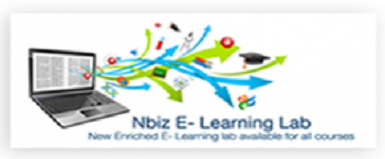
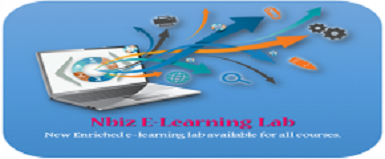
 Special Offers
Special Offers
 GET OUR BEST DEALS!
GET OUR BEST DEALS!